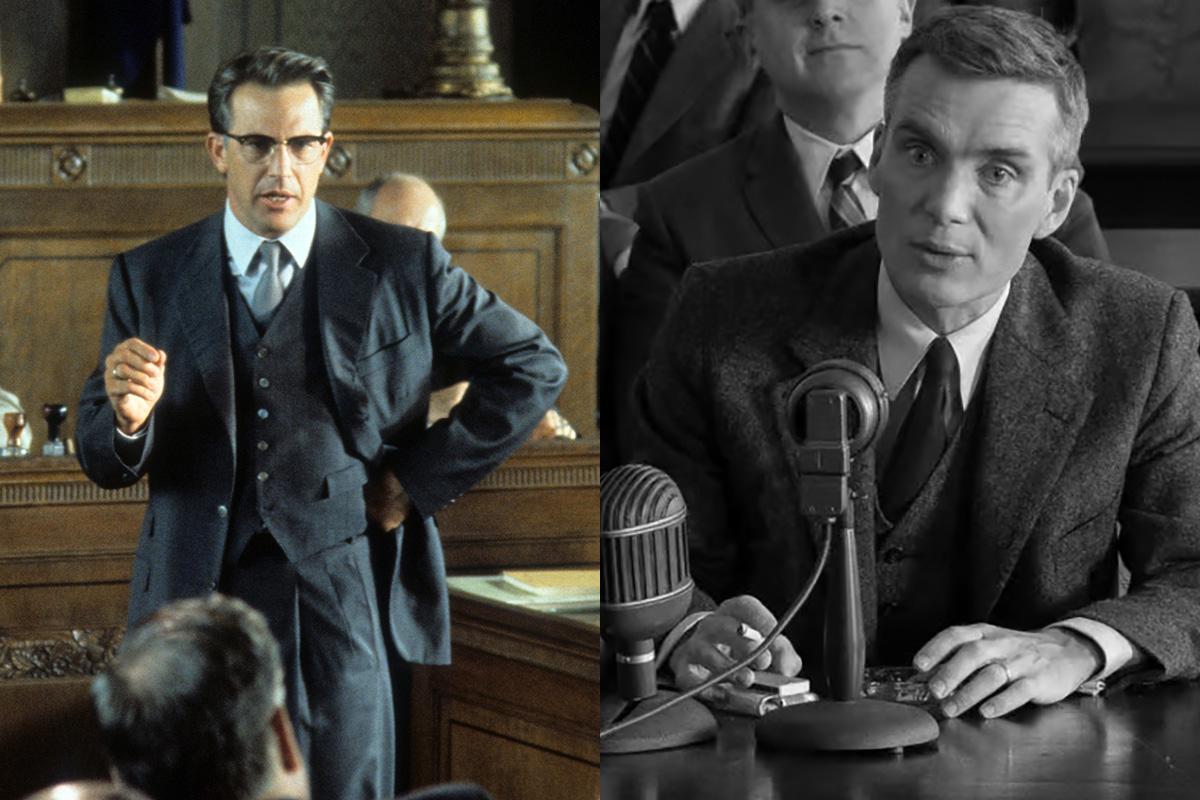How ‘Oppenheimer’ Paid Homage to This Controversial Nineties Drama

In 1991, Oliver Stone’s JFK was released, bringing a world of conspiracy theories to movie theaters across the globe. Of course, people had been theorizing and obsessing over the assassination of President John F. Kennedy for decades since his tragic death in 1963. But Stone’s opus brought those conspiracy theories to the mainstream. This was pre-internet, long before folks could fall down any conspiracy rabbit hole with the click of a mouse. Adapted from the books On the Trail of the Assassins by Jim Garrison and Crossfire: The Plot That Killed Kennedy by Jim Marrs, JFK was controversial because it combined multiple conspiracy theories around the assassination with Stone’s own theories of what went down. But despite criticisms of Stone’s liberal interpretation of historical events, the film was met with critical acclaim and box office success. Alas, that’s Hollywood.
Personally, I think anyone watching JFK for historical accuracy should probably read a book instead. So when Christopher Nolan said that Stone’s JFK inspired his latest film, Oppenheimer, I could instantly see the comparisons. JFK uses black and white to tell part of the story, but not in the same way Oppenheimer does. Both films feature a sprawling cast of characters played by some of the best actors of their generation. Both films run nearly 3 hours, and both require multiple viewings to unfold their densely packed narratives.
JFK somehow manages to be even longer than Oppenheimer at 188 minutes (with a director’s cut at 205 minutes). But while Oppenheimer moves at a quick pace, JFK is a slow burn of a film with a third act that makes the journey worth it.
Casting Oppenheimer
Both films feature a large cast of notable actors and sprawling storylines that take place over several years. Nolan even said that the large cast for Oppenheimer was a callback to big event films like JFK. And both films feature Gary Oldman in pivotal cameos, playing Lee Harvey Oswald in JFK and President Truman in Oppenheimer.
Nolan also referenced Richard Donner’s Superman (1978) as an example of an “event” film, telling TotalFilm, “I remember as a kid just seeing these big actors — Glen Ford … Marlon Brando … Gene Hackman … this incredible cast. It made the film feel so big … That was something that went out of pop filmmaking in some ways. With Batman Begins, we really tried to bring it back. So whilst I’ve always tried to cast the best possible actors, there’s a reason that a lot of movie stars are where they are. It’s for me, a really fun and challenging combination of an incredible ensemble, but the film is so focused on one man’s experience, and one man’s view of the world.”
It makes sense when you think about how Oppenheimer introduces its characters. Much like how JFK brings in new characters via Jim Garrison’s (Kevin Costner) quest for answers, Oppenheimer unfolds its narrative during both Lewis Strauss’ (Robert Downey Jr.) confirmation hearing and J. Robert Oppenheimer’s (Cillian Murphy) AEC investigation.
Stone’s own Oppenheimer connection
Since the release of Oppenheimer, Stone has been talking about his own past with the subject, praising Nolan’s work as a “classic.” Stone praised Nolan’s work in a series of X posts, writing, “Saturday, I sat through 3 hours of Oppenheimer, gripped by Chris Nolan’s narrative. His screenplay is layered & fascinating. Familiar with the book by Kai Bird & Martin J. Sherwin, I once turned the project down because I couldn’t find my way to its essence. Nolan has found it.”
He goes on to post a thread about his own attempts to adapt Oppenheimer’s life and how he didn’t think it was something that could be made in today’s climate. The thread offers a look into Stone’s views as both a filmmaker and history buff, who clearly relishes exploring figures in America’s complicated past.
The JFK of it all
Oppenheimer features a scene during Strauss’s confirmation hearing where he makes note of a “junior senator” from Massachusetts who didn’t take kindly to how Strauss treated Oppenheimer. The senator in question is JFK himself. What I find fascinating is the use of John F. Kennedy in both films. In Stone’s film, we only see Kennedy in his assassination footage. In Oppenheimer, we only hear of him by name. His presence looms large in both films, but he is not the focus.
The films pair well together as a long-running double feature on American history, political conspiracy, and the outsized power wielded by a small group of men. And while Nolan has no plans for a follow-up to Oppenheimer, I would be curious to see him tackle a political saga like the Kennedys in the future.
(featured image: Warner Bros./Universal Pictures)
Have a tip we should know? tips@themarysue.com